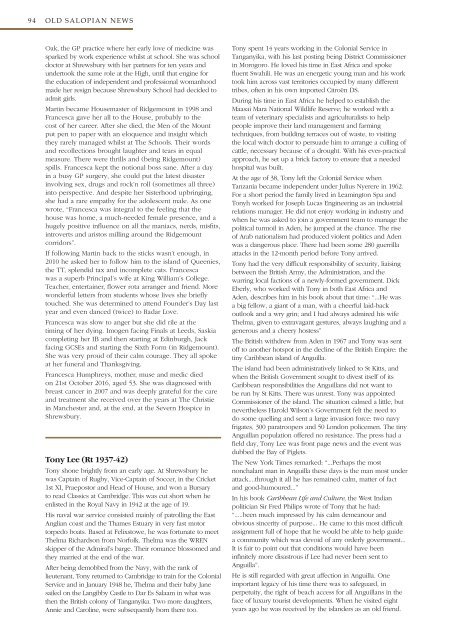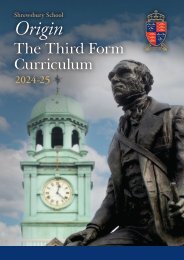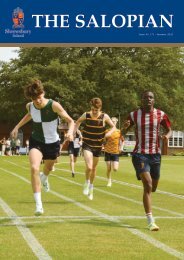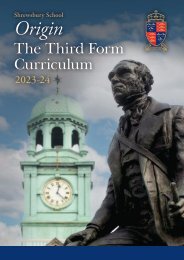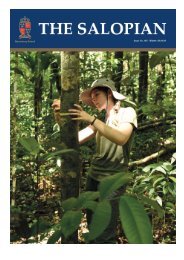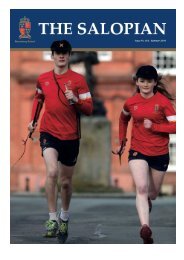The Salopian no. 160 - Summer 2017
- No tags were found...
You also want an ePaper? Increase the reach of your titles
YUMPU automatically turns print PDFs into web optimized ePapers that Google loves.
94<br />
OLD SALOPIAN NEWS<br />
Oak, the GP practice where her early love of medicine was<br />
sparked by work experience whilst at school. She was school<br />
doctor at Shrewsbury with her partners for ten years and<br />
undertook the same role at the High, until that engine for<br />
the education of independent and professional womanhood<br />
made her resign because Shrewsbury School had decided to<br />
admit girls.<br />
Martin became Housemaster of Ridgemount in 1998 and<br />
Francesca gave her all to the House, probably to the<br />
cost of her career. After she died, the Men of the Mount<br />
put pen to paper with an eloquence and insight which<br />
they rarely managed whilst at <strong>The</strong> Schools. <strong>The</strong>ir words<br />
and recollections brought laughter and tears in equal<br />
measure. <strong>The</strong>re were thrills and (being Ridgemount)<br />
spills. Francesca kept the <strong>no</strong>tional boss sane. After a day<br />
in a busy GP surgery, she could put the latest disaster<br />
involving sex, drugs and rock’n roll (sometimes all three)<br />
into perspective. And despite her Sisterhood upbringing,<br />
she had a rare empathy for the adolescent male. As one<br />
wrote, “Francesca was integral to the feeling that the<br />
house was home, a much-needed female presence, and a<br />
hugely positive influence on all the maniacs, nerds, misfits,<br />
introverts and aristos milling around the Ridgemount<br />
corridors”.<br />
If following Martin back to the sticks wasn’t e<strong>no</strong>ugh, in<br />
2010 he asked her to follow him to the island of Queenies,<br />
the TT, splendid tax and incomplete cats. Francesca<br />
was a superb Principal’s wife at King William’s College.<br />
Teacher, entertainer, flower rota arranger and friend. More<br />
wonderful letters from students whose lives she briefly<br />
touched. She was determined to attend Founder’s Day last<br />
year and even danced (twice) to Radar Love.<br />
Francesca was slow to anger but she did rile at the<br />
timing of her dying. Imogen facing Finals at Leeds, Saskia<br />
completing her IB and then starting at Edinburgh, Jack<br />
facing GCSEs and starting the Sixth Form (in Ridgemount).<br />
She was very proud of their calm courage. <strong>The</strong>y all spoke<br />
at her funeral and Thanksgiving.<br />
Francesca Humphreys, mother, muse and medic died<br />
on 21st October 2016, aged 53. She was diag<strong>no</strong>sed with<br />
breast cancer in 2007 and was deeply grateful for the care<br />
and treatment she received over the years at <strong>The</strong> Christie<br />
in Manchester and, at the end, at the Severn Hospice in<br />
Shrewsbury.<br />
Tony Lee (Rt 1937-42)<br />
Tony shone brightly from an early age. At Shrewsbury he<br />
was Captain of Rugby, Vice-Captain of Soccer, in the Cricket<br />
1st XI, Praepostor and Head of House, and won a Bursary<br />
to read Classics at Cambridge. This was cut short when he<br />
enlisted in the Royal Navy in 1942 at the age of 19.<br />
His naval war service consisted mainly of patrolling the East<br />
Anglian coast and the Thames Estuary in very fast motor<br />
torpedo boats. Based at Felixstowe, he was fortunate to meet<br />
<strong>The</strong>lma Richardson from Norfolk. <strong>The</strong>lma was the WREN<br />
skipper of the Admiral’s barge. <strong>The</strong>ir romance blossomed and<br />
they married at the end of the war.<br />
After being demobbed from the Navy, with the rank of<br />
lieutenant, Tony returned to Cambridge to train for the Colonial<br />
Service and in January 1948 he, <strong>The</strong>lma and their baby Jane<br />
sailed on the Langibby Castle to Dar Es Salaam in what was<br />
then the British colony of Tanganyika. Two more daughters,<br />
Annie and Caroline, were subsequently born there too.<br />
Tony spent 14 years working in the Colonial Service in<br />
Tanganyika, with his last posting being District Commissioner<br />
in Morogoro. He loved his time in East Africa and spoke<br />
fluent Swahili. He was an energetic young man and his work<br />
took him across vast territories occupied by many different<br />
tribes, often in his own imported Citroën DS.<br />
During his time in East Africa he helped to establish the<br />
Maasai Mara National Wildlife Reserve; he worked with a<br />
team of veterinary specialists and agriculturalists to help<br />
people improve their land management and farming<br />
techniques, from building terraces out of waste, to visiting<br />
the local witch doctor to persuade him to arrange a culling of<br />
cattle, necessary because of a drought. With his ever-practical<br />
approach, he set up a brick factory to ensure that a needed<br />
hospital was built.<br />
At the age of 38, Tony left the Colonial Service when<br />
Tanzania became independent under Julius Nyerere in 1962.<br />
For a short period the family lived in Leamington Spa and<br />
Tonyh worked for Joseph Lucas Engineering as an industrial<br />
relations manager. He did <strong>no</strong>t enjoy working in industry and<br />
when he was asked to join a government team to manage the<br />
political turmoil in Aden, he jumped at the chance. <strong>The</strong> rise<br />
of Arab nationalism had produced violent politics and Aden<br />
was a dangerous place. <strong>The</strong>re had been some 280 guerrilla<br />
attacks in the 12-month period before Tony arrived.<br />
Tony had the very difficult responsibility of security, liaising<br />
between the British Army, the Administration, and the<br />
warring local factions of a newly-formed government. Dick<br />
Eberly, who worked with Tony in both East Africa and<br />
Aden, describes him in his book about that time: “...He was<br />
a big fellow, a giant of a man, with a cheerful laid-back<br />
outlook and a wry grin; and I had always admired his wife<br />
<strong>The</strong>lma, given to extravagant gestures, always laughing and a<br />
generous and a cheery hostess”<br />
<strong>The</strong> British withdrew from Aden in 1967 and Tony was sent<br />
off to a<strong>no</strong>ther hotspot in the decline of the British Empire: the<br />
tiny Caribbean island of Anguilla.<br />
<strong>The</strong> island had been administratively linked to St Kitts, and<br />
when the British Government sought to divest itself of its<br />
Caribbean responsibilities the Anguillans did <strong>no</strong>t want to<br />
be run by St Kitts. <strong>The</strong>re was unrest. Tony was appointed<br />
Commissioner of the island. <strong>The</strong> situation calmed a little, but<br />
nevertheless Harold Wilson’s Government felt the need to<br />
do some quelling and sent a large invasion force: two navy<br />
frigates, 300 paratroopers and 50 London policemen. <strong>The</strong> tiny<br />
Anguillan population offered <strong>no</strong> resistance. <strong>The</strong> press had a<br />
field day, Tony Lee was front page news and the event was<br />
dubbed the Bay of Piglets.<br />
<strong>The</strong> New York Times remarked: “...Perhaps the most<br />
<strong>no</strong>nchalant man in Anguilla these days is the man most under<br />
attack....through it all he has remained calm, matter of fact<br />
and good-humoured...”<br />
In his book Caribbean Life and Culture, the West Indian<br />
politician Sir Fred Philips wrote of Tony that he had:<br />
“.....been much impressed by his calm demea<strong>no</strong>ur and<br />
obvious sincerity of purpose... He came to this most difficult<br />
assignment full of hope that he would be able to help guide<br />
a community which was devoid of any orderly government...<br />
It is fair to point out that conditions would have been<br />
infinitely more disastrous if Lee had never been sent to<br />
Anguilla”.<br />
He is still regarded with great affection in Anguilla. One<br />
important legacy of his time there was to safeguard, in<br />
perpetuity, the right of beach access for all Anguillans in the<br />
face of luxury tourist developments. When he visited eight<br />
years ago he was received by the islanders as an old friend.


